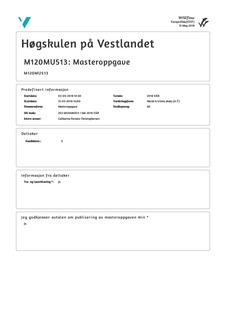| dc.description.abstract | This study employs philosophical critique in order to determine whether a measure of adaption of the Suzuki Method may help alleviate some of the challenges to music teaching in the Norwegian School of Music and Performing Arts (in Norway called ‘kulturskolen’). In order to effectively address this question, the following topics are examined: 1) Current challenges to music teaching in the Norwegian School of Music and Preforming Arts (SMPA), with particular attention to those seen as potentially relevant to the Suzuki Method. 2) Detailed description of the Suzuki Method (its origins, emphases, limitations, underlying assumptions and problems in intercultural adaptation). 3) Description and critique of relevant arguments: (a) regarding goals and values within the Suzuki Method (b) in opposition to Suzuki Method, (c) that challenge the need for codified approaches to teaching, and (d) that suggest intercultural adaptation is too problematic. 4) A discussion about the feasibility of adaption and implementation of elements from the Suzuki Method in the School of Music and Performing Arts. Based on this line of argumentation I conclude that piano pedagogy in the SMPA would benefit from: 1) stronger parental involvement, 2) integration of group teaching, 3) fruitful collegiality among teachers, and 4) a culture of teacher responsibility for child-development as seen in the Suzuki method. However, the method is oriented mostly towards the classical music tradition, other styles are not part of the standard repertoire, and neither is there a tradition of cultivating improvisation and composition. The main challenges I see in the SMPA is a lack of common values, goals, missions, professional progress and interactions between teachers. I suggest that using the Suzuki Method as framework for pedagogical ideas, thoughts and discussion, would provide solutions to these challenges. The implementation of elements of the Suzuki method could imply an opening towards more discussion, a questioning of our practices, and the
establishment of stronger and more suitable relations among student, teacher, management and parents. This, in turn, could enhance the quality of the learning environment for the student, and make outcomes more predictable. | nb_NO |

